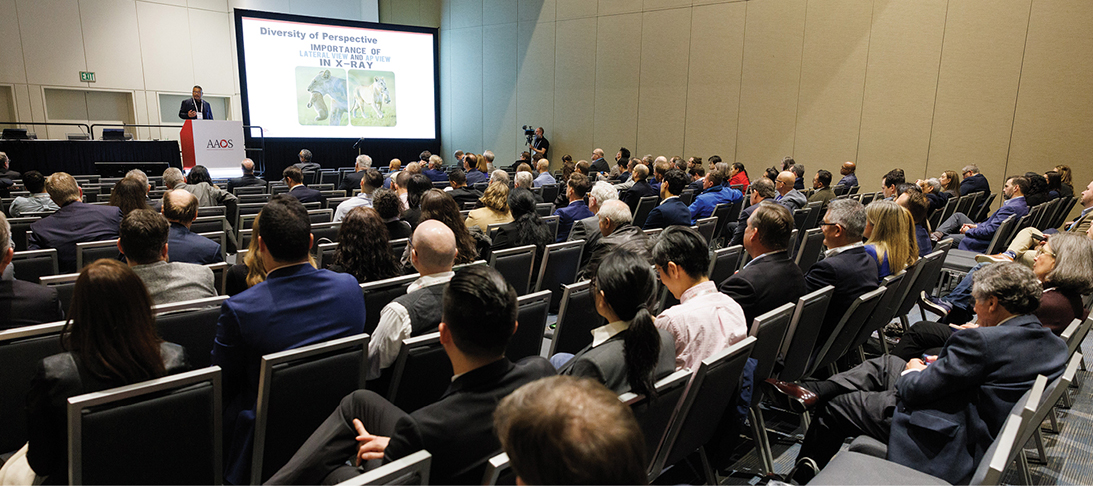
The 21st Century Cures Act, signed into law in 2016, was intended to bring medical innovation and advances to patients more quickly and efficiently. In response to this call to action, the U.S. FDA created a framework for evaluating real-world evidence to support the approval of new indications for drugs or devices that are already approved for other uses. This framework also provides post-approval study requirements.
During the AAOS 2024 Annual Meeting, AAOS and the FDA co-hosted a Town Hall symposium to examine the need for diversity in the collection of real-world evidence on the use of medical devices. Presentations covered a wide variety of relevant topics emphasizing the importance of capturing data from diverse populations in all clinical trials and in orthopaedic registries.
Historical examples
To help illustrate the importance of including diversity in real-world evidence, Daryll C. Dykes, MD, PhD, JD, FAAOS, professor and chief diversity officer at Upstate Medical University in Syracuse, New York, discussed historical examples in medicine that were affected by a lack of diversity. One example, Dr. Dykes identified, is the use of pulse oximeter, which works by shining light through the tip of a patient’s finger. The device collects the light waves on the other side and can determine the relative saturation of oxygen in the blood stream, Dr. Dykes explained.
“We have known since the 1970s that if you shine light through lightly pigmented skin, it will be received on the other side differently than through darkly pigmented skin,” Dr. Dykes said. “What we didn’t know until recently was that racial and ethnic disparities in pulse oximetry would result in delayed identification and treatment of eligible patients with COVID-19.”
The issue was not so much with pulse oximeters, he said, but rather the risk algorithms based on homogenous populations, and there were no adjustments for differently pigmented skin. Recognizing these limitations in real-world data is important, Dr. Dykes emphasized, especially as more data are being used to feed artificial intelligence and machine-learning algorithms used in healthcare. “If those technologies are not representative, they will not be applicable for general population use,” he said.
Representative registries
James Huddleston III, MD, FAAOS, professor of orthopaedic surgery at Stanford Medicine, provided attendees with an update on the AAOS Registry Program and discussed how diversity is supported within its existing registries: American Joint Replacement Registry (AJRR), Fracture & Trauma Registry, Musculoskeletal Tumor Registry, Shoulder & Elbow Registry, and American Spine Registry. “It has been more than 6 years since AAOS launched the Registry Program, and the power of registry data is contributing to meaningful change in orthopaedics,” Dr. Huddleston said.
Currently, more than 1,400 sites and 14,000 surgeons are participating in AAOS registries. The registries play a critical role in providing diverse datasets across a broad range of practice settings and expanding clinical knowledge beyond what is learned through randomized clinical trials, Dr. Huddleston said.
Specifically, real-world data from registries illustrate variations in a disease’s treatment and outcomes, variations in care delivery, and quality of care and care effectiveness. The data also provide a better understanding of safety signals and opportunities for enhanced surveillance and help identify factors that influence disease prognosis and associated quality of life for patients.
The AAOS Registry Program has also prioritized diversity in data capture and research analysis, Dr. Huddleston said. For example, the Office of Disability Employment Policy (ODEP) recently confirmed that performance trends and survivorship were similar across hip and knee arthroplasty devices in the AJRR and the National Joint Registry, which utilizes data from the United Kingdom. The greatest consistency was found in the all-age and age ≥65 cohorts. This focused comparison of hip/knee device survivorship showed encouraging results for reliability of patient outcomes captured in AJRR compared with the world’s largest joint arthroplasty registry, Dr. Huddleston said. This alignment has strong implications for global improvement in patient safety, including evaluation of new devices in the American market, which may also facilitate earlier ODEP certification and use internationally.
The session included two speakers from the FDA who discussed its role in supporting diversity in real-world evidence: William Maisel, MD, MPH, director of the FDA’s Center for Devices and Radiological Health (CDRH) Office of Product Evaluation and Quality, and Capt. Raquel Peat, PhD, MPH, USPHS, director of the Office of Health Technology 6: Office of Orthopedic Devices within CDRH. The session closed with an inspiring presentation from Army veteran Staff Sgt. Kisha Makerney, the first women to deploy to a combat zone after losing a limb. Sgt. Makerney detailed her long and often frustrating journey as an amputee seeking to return to active duty and eventually flight school. Throughout various stages of her recovery, Makerney repeatedly faced delays and obstacles, all while watching her male counterparts receive help with healing and expedited return to duty. She struggled to find an advocate to support her dreams. The delays she faced ultimately cost her dream of flying fixed-wing aircraft in the Army. Her story, she said, illustrates why “diversity matters.”
Other session speakers included Anthony E. “AJ” Johnson, MD, FAAOS, FACS, FAOA, LTC, MC, USA (Ret.), chair of the AAOS Diversity Advisory Board; David Jevsevar, MD, MBA, FAAOS, chair of the AAOS Research and Quality Council; Kevin J. Bozic, MD, MBA, FAAOS, FACS, FAOA, immediate past president of AAOS; and moderator S. Raymond Golish, MD, PhD, MBA, FAAOS, chief medical officer at HCA Healthcare.
Leah Lawrence is a freelance medical writer for AAOS Now.
References
- Springer BD, Mullen K, Donnelly P, et al: Is American Joint Replacement Registry data consistent with international survivorship in hip and knee arthroplasty? A comparative analysis. J Arthroplasty 2024:S0883-5403(24)00175-X.